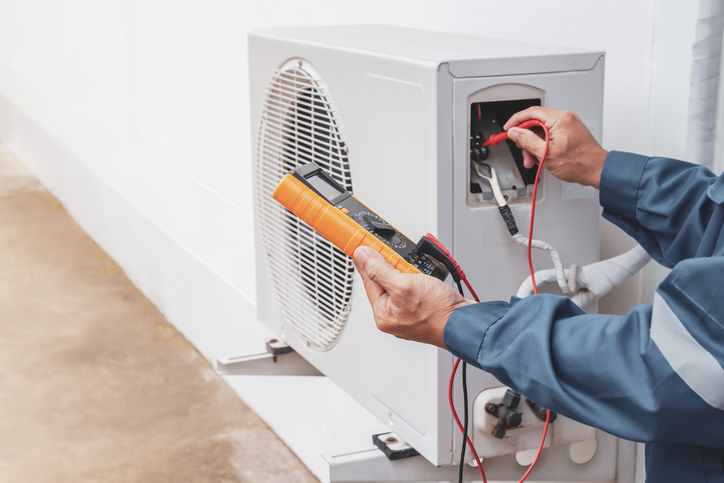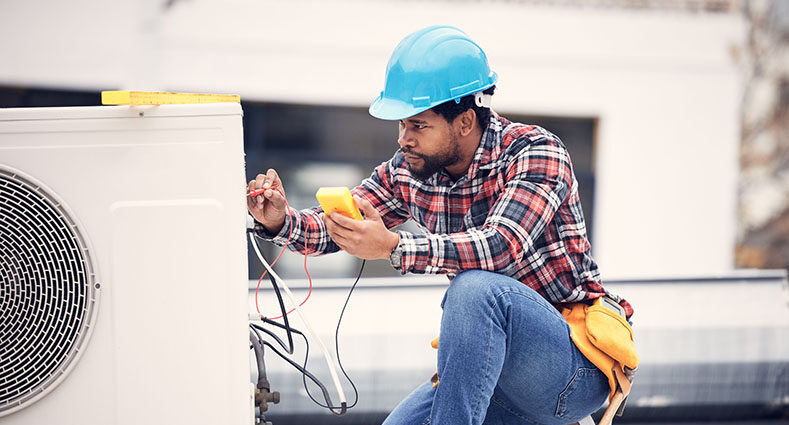10 questions you should ask before hiring an HVAC contractor
The Relevance of HVAC Knowledge: Uncovering Reasons For Air Conditioning Issues for House Owners
Home owners typically ignore the relevance of recognizing their HVAC systems. Recognizing usual indications of a/c issues can result in timely treatments. Issues like not enough cooling or uncommon noises are not simply aggravations; they can indicate much deeper issues. By discovering the origin of these troubles, homeowners can boost system efficiency and prolong its life expectancy. What are one of the most prevalent concerns that can arise, and just how can they be efficiently dealt with?
Typical Signs of AC Issues
How can homeowners identify concerns with their a/c systems before they escalate? Recognizing usual indications of AC troubles is necessary for timely maintenance. One common indication is insufficient cooling; if the cooling device stops working to reduce the interior temperature, it might signify underlying concerns. Unusual sounds, such as grinding or hissing, can additionally suggest mechanical failures or loose components - ac fix. Additionally, homeowners should watch out for odd smells emanating from the device, which could suggest mold growth or electric troubles. Constant biking on and off, understood as short cycling, can suggest thermostat concerns or cooling agent leaks. Moreover, a rise in energy costs without an equivalent surge in use may indicate ineffectiveness. By remaining sharp to these warning indications, property owners can avoid a lot more considerable problems and costly repair work, guaranteeing their air conditioning systems run successfully throughout the warmer months

Comprehending Cooling Agent Issues
Refrigerant concerns can considerably impact the performance of a heating and cooling system. Homeowners must understand the indications of low cooling agent levels and the relevance of detecting cooling agent leakages. Dealing with these problems promptly can prevent additional damage to the system and warranty height cooling down performance.
Reduced Cooling Agent Levels
A common problem that homeowners might come across with their heating and cooling systems is reduced cooling agent degrees, which can considerably affect the system's efficiency and efficiency. Cooling agent is vital for the cooling process, soaking up warm from interior air and launching it outside. When degrees drop, the air conditioning device battles to cool down the room effectively, bring about enhanced power usage and possible system stress. Signs of reduced refrigerant include inadequate cooling, longer run times, and ice formation on the evaporator coils. Property owners might additionally observe unusual sounds as the compressor functions harder to make up for the shortage. It is very important for homeowners to comprehend the significance of preserving proper refrigerant degrees to ensure peak a/c efficiency and longevity.
Refrigerant Leaks Discovery
Where might a homeowner start when confronted with the opportunity of cooling agent leaks in their HVAC system? The very first step includes monitoring the system's efficiency. Indications such as reduced cooling efficiency, ice formation on coils, or hissing noises might show a cooling agent leakage. Home owners need to additionally look for visible indications of oil deposit, often an indication of a leak. Making use of a refrigerant leakage detector can supply even more accurate identification. If uncertainties linger, seeking advice from a licensed a/c service technician is vital, as they have the knowledge and tools to situate leaks effectively. Motivate detection and repair of cooling agent leakages not only boost system effectiveness yet also prevent potential environmental injury, making it an important element of a/c upkeep.
Electric Failures and Their Influence
Electrical failures can substantially impact heating and cooling systems, particularly with problems like breaker breakdowns and defective electrical wiring. These problems not only interrupt the system's efficiency yet can also cause expensive fixings and security risks. Comprehending the implications of such failings is crucial for property owners to preserve an effective and secure a/c setting.
Breaker Issues
How can breaker issues affect the effectiveness of a cooling and heating system? Breaker act as vital safety and security gadgets that manage electric circulation to a/c devices. If a circuit breaker journeys regularly, it interrupts power supply, bring about irregular home heating or air conditioning. This can cause significant strain on the system, resulting in inefficient procedure and potential damage to components. Property owners may discover enhanced energy expenses as a result of the cooling and heating system's struggle to maintain wanted temperatures. In addition, repeated disturbances from tripped breakers can shorten the life-span of the a/c device, needing pricey repair services or replacements. Normal maintenance of breaker is vital, as it guarantees a steady power supply, eventually improving the overall performance of the heating and cooling system.
Faulty Circuitry Outcome
Frequently overlooked, damaged electrical wiring can have alarming repercussions for a/c systems. Wiring problems may lead to brief circuits, leading to constant breakdowns and raised repair expenses. In addition, incorrect electrical wiring can cause ineffective energy use, leading to greater energy costs and strain on the system. In extreme instances, damaged wiring can set off electrical fires, posing a significant security risk to house owners. In addition, these electrical failings can harm cooling and heating parts, causing pricey substitutes or comprehensive repair services. Homeowners ought to focus on normal inspections by certified professionals to recognize and fix electrical wiring problems before they intensify. Recognizing the implications of faulty electrical wiring can aid assure the durability and safety and security of cooling and heating systems, ultimately protecting both the home and its occupants.
Clogged Filters and Their Consequences
While many property owners might neglect the relevance of normal filter upkeep, clogged filters can lead to considerable repercussions for cooling and heating systems. When filters come to be blocked with dust, dirt, and debris, air movement is restricted. This reduction in airflow requires the system to function harder, leading to enhanced power intake and potentially greater energy costs. With time, this pressure can trigger damage on components, causing premature system failure.
In addition, stopped up filters can endanger indoor air high quality. Contaminants and irritants may circulate throughout the home, intensifying respiratory system concerns and allergic reactions for occupants. Insufficient air flow can cause the evaporator coil to freeze, leading to costly repairs and ineffective cooling performance. Regularly changing or cleaning up filters is a straightforward yet vital upkeep task that can assist guarantee the long life and effectiveness of cooling and heating systems, inevitably profiting both the property owner's convenience and their funds.

Thermostat Malfunctions Described
What occurs when a thermostat malfunctions can greatly impact both convenience and power efficiency in a home (AC repairman). A faulty thermostat might fail to properly check out the temperature, leading to overcooling or not enough cooling. This inconsistency can create discomfort for residents and lead to higher energy expenses, as the cooling and heating system works harder than required
Usual concerns consist of dead batteries, company website which can provide electronic thermostats faulty, and loose wiring that disrupts communication between the thermostat and the a/c system. Additionally, out-of-date or poorly calibrated thermostats may not react correctly to temperature modifications, better worsening energy inadequacy.
Home owners need to be alert for signs of malfunction, such as irregular temperatures or unforeseen energy prices. Routine checks and understanding of the thermostat's functionality can assist recognize issues early, making sure peak efficiency of the a/c system. Resolving thermostat problems quickly is important for preserving a comfy living atmosphere and handling power consumption efficiently.
The Function of Routine Maintenance
Routine maintenance plays a vital role in making certain the long life and effectiveness of heating and cooling systems. House owners who focus on regular checks can stop small issues from intensifying into costly repair work. Routine upkeep typically includes tasks such as cleansing filters, examining ductwork, and checking refrigerant degrees. These tasks help keep excellent air movement and system performance, decreasing energy consumption.
A properly maintained Cooling and heating system operates extra successfully, giving regular comfort throughout the home. Regular tune-ups can also expand the life expectancy of the system, bring about substantial cost savings with time. Property owners are motivated to schedule expert evaluations a minimum of as soon as a year to recognize prospective problems early.
On top of that, numerous makers require regular upkeep to support guarantees, making this practice not only useful however commonly essential. On the whole, understanding the value of regular upkeep empowers homeowners to protect their a/c systems versus unforeseen failures and boost their financial investment in home comfort.
Frequently Asked Concerns
How Can I Enhance My Ac's Power Efficiency?
Improving an air conditioning's power performance entails normal upkeep, cleansing or replacing filters, securing ductwork, making certain correct insulation, using programmable thermostats, and scheduling expert examinations to identify and correct possible issues impacting performance.
What Is the Life expectancy of a Common Cooling Device?
A common cooling device has a life-span of 15 to two decades, depending upon upkeep, usage, and environmental factors. Regular upkeep can greatly prolong its functional life and boost overall efficiency.
When Should I Replace My Cooling System?
An a/c system need to generally be changed every 10 to 15 years. Indicators for replacement include constant repair work, increasing power costs, and inadequate cooling, indicating that an upgrade might be more cost-effective and efficient.
Can I Repair Air Conditioner Troubles Myself?
Yes, individuals can repair air conditioning issues themselves by checking filters, making certain power supply, and evaluating for visible issues (AC repairman). Nonetheless, intricate problems usually need specialist assistance read more for accurate medical diagnosis and secure repair, making certain optimal system performance
How Do I Pick a Trustworthy Heating And Cooling Technician?

To select a trusted a/c specialist, one need to look for referrals, check on-line evaluations, confirm licenses and insurance coverage, assess experience, click here to find out more and demand in-depth quotes to guarantee high quality solution and reasonable rates before choosing.
Conclusion
To summarize, a solid understanding of heating and cooling systems makes it possible for home owners to effectively diagnose and attend to typical cooling issues. Identifying signs such as poor cooling or rising energy costs permits for prompt treatments, which can greatly improve system effectiveness and longevity. By staying educated about possible troubles like cooling agent leaks, electric failings, and clogged up filters, homeowners can take positive actions to maintain their systems, inevitably guaranteeing convenience and advertising a much healthier living environment. Routine maintenance continues to be essential to this endeavor.